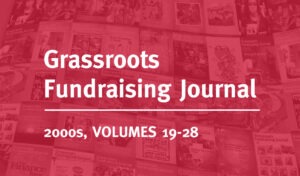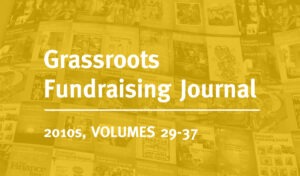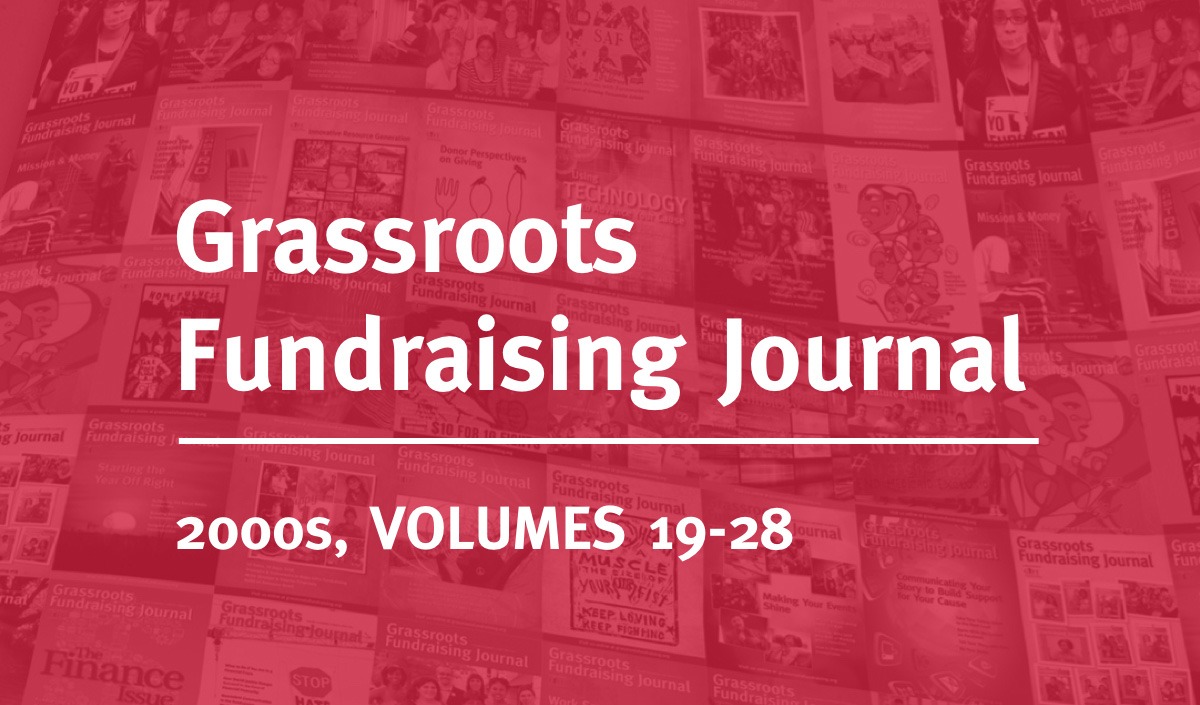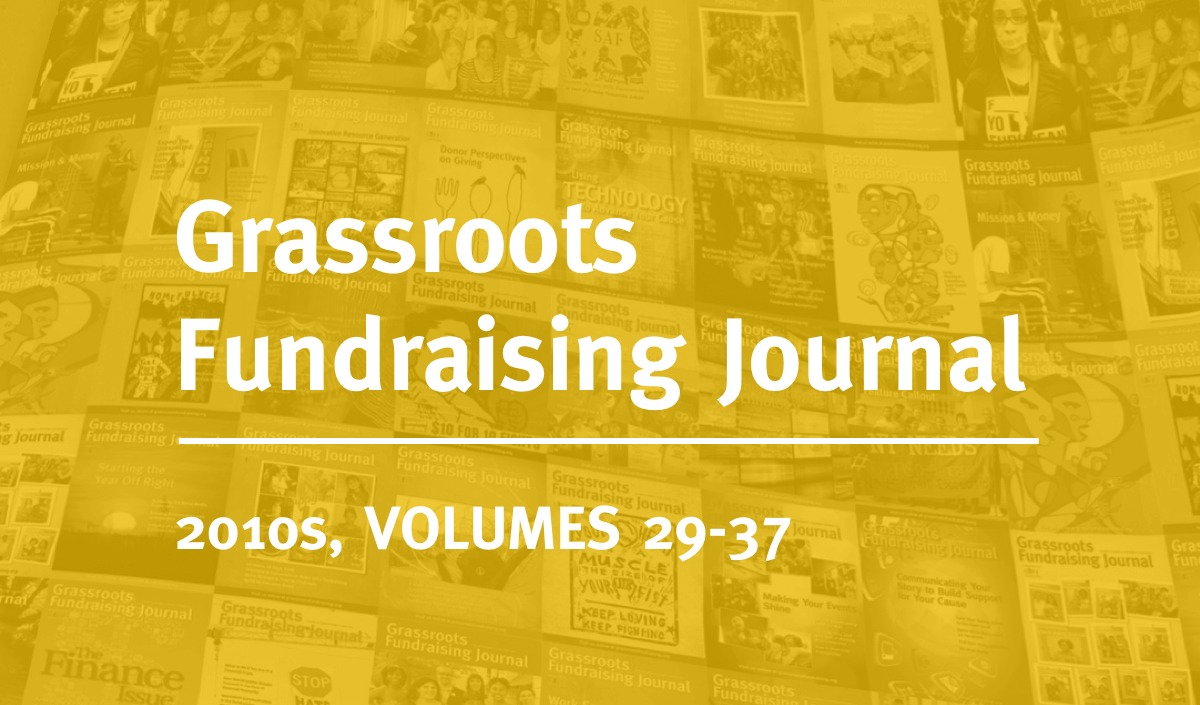
Editors’ note: This article, first published in print during Nov/Dec 2005, has been republished for Nonprofit Quarterly with minor updates.
The first thing Wes Mukoyama asks me after we greet each other at the beginning of our phone interview is, “So, tell me a little about yourself.” It’s clear from the start that Wes likes to make a connection with whoever he’s talking to, even if it’s over the phone. Our conversation starts off amiably, and Wes’s easy going manner and rolling, husky voice makes it easy to understand why he can relate well to clients and donors at the Yu Ai Kai Senior Center.
“It goes back to social work. I know I can connect to people,” says Wes, and his story — starting off as a reluctant fundraiser and moving along a transformative path that led him to be a firm believer in the art of grassroots fundraising — shows that his knack for connecting with people has served him and his organization well.
Yu Ai Kai is a 31-year-old organization based in San Jose’s Japan town. The center serves more than 200 Japanese American, Filipino-American, Korean-American, and Chinese-American seniors daily. The center works to provide culturally appropriate programs like Meals on Wheels with hot Asian food as well as social activities such as ballroom dancing classes and Tai Chi. The center is also a social hub for the Japanese community, and it hosts events for the Japanese-American Museum of San Jose and other local institutions. Wes is a counselor at Yu Ai Kai as well as the center executive director.
“I was not asking for money for me but for the organization, which I love and believe in very much. Just realizing my own resistance gave me a sense of being freed up.”
Before his tenure at Yu Ai Kai, Wes had been a social worker with the Veterans Affairs bureau and traveled to faraway places with the Peace Corps. He also served on Yu Ai Kai’s board of directors for fifteen years before transitioning to his current role in 2001. Despite the challenges of being the lone fundraiser on staff, Wes has succeeded at building a strong donor base and is preparing to launch a capital campaign so that Yu Ai Kai can purchase a neighboring building as well as expand their current facility to include a sunroom where seniors can play ping pong or chess, or sit and read the newspaper.
Currently, about one-third of Yu Ai Kai’s income comes from government sources, one-fourth comes from individual donors, and the rest is a mix of United Way, foundation, and in-kind support. But it wasn’t until recently that Wes began to focus more of his energy on individual donors. As a participant in last year’s Fundraising Academy for Communities of Color (a training and coaching program cosponsored by the Journal and Compass Point Nonprofit Services in San Francisco), he was initially quite resistant to the idea of asking people directly for money. Journal editor Stephanie Roth, one of the trainers in the Fundraising Academy, remembers, “Wes was skeptical about how donors to Yu Ai Kai would respond to a personal solicitation for a major gift, and he was very outspoken about it in the training.”
Part of Wes’s resistance was rooted in a cultural dynamic that he felt would make fundraising difficult for his organization and his community. According to Wes, Japanese culture is less direct and less aggressive in general than Western culture, so the idea of asking donors face-to-face for money was “rather alien” for him.
But with support from his colleagues and from trainers in the Academy, and from Yu Ai Kai’s development consultant, Maria Gitin, Wes has not only identified the roots of his fears of asking for money, but has learned how to overcome them.
“I came from a poor background in Chicago,” says Wes. “Money was something that was [considered] ugly…. As a social worker, it was not an ambition of mine to make money.”
In his role as executive director at Yu Ai Kai, however, fundraising is Wes’s primary responsibility. The Academy not only helped Wes develop concrete fundraising skills, such as how to do a face-to-face ask or write an annual appeal letter through storytelling, it also allowed him to move beyond his fears of fundraising so that he could better fulfill his organization’s needs.
Sign up for our free newsletters
Subscribe to NPQ's newsletters to have our top stories delivered directly to your inbox.
By signing up, you agree to our privacy policy and terms of use, and to receive messages from NPQ and our partners.
During the Academy, Wes says, he realized, “I was not asking for money for me but for the organization, which I love and believe in very much. Just realizing my own resistance gave me a sense of being freed up.”
After Wes popped the question, he recalls that the donor “just nodded his head and said, ‘OK.’ I was ecstatic. It felt like being on a first date.”
Wes’s first major donor ask was with a donor who had consistently given between $500 and $1,000 to Yu Ai Kai every year. “I decided this guy’s got to be recognized and thanked,” says Wes, who got coaching from his development consultant on how to approach the donor and, eventually, do the ask. Wes had two meetings with the donor before getting to the ask itself, which was for $10,000 — more than Wes had ever asked for before.
After Wes popped the question, he recalls that the donor “just nodded his head and said, ‘OK.’ I was ecstatic. It felt like being on a first date.” The donor made a $10,000 contribution to Yu Ai Kai, and is now part of the center’s capital campaign committee. His success with this first ask gave Wes a new sense of confidence in his own fundraising ability and in donors’ openness to being asked.
“I cannot be a phony,” says Wes about his new attitudes about asking for money, “I kept telling myself that if I build a relationship, even if that person is capable of giving money, what’s important is the understanding that she and I have this relationship with Yu Ai Kai. And it’s the relationship that’s important, not the money.”
Even though, as Chair of Yu Ai Kai’s board of directors, Wes helped oversee a capital campaign to purchase the center’s current facility, as executive director the expectations of him are much higher.
“Now I have to act as a role model,” says 4 Wes of his new role. Under Wes’s leadership, Yu Ai Kai has established a 12-member capital campaign committee, and they’re not done yet. But despite his successes in building a fundraising infrastructure and raising money for Yu Ai Kai, Wes is still working to address some key challenges in order to make his organization’s fundraising program even stronger.
One common challenge for nonprofits is getting the board invested in working on fundraising. Though he has helped get training for his board on creating a case statement and cultivating individual donors, and built a solid capital campaign committee, Wes still feels that more can happen. Prospect identification in particular has been difficult.
“There are three or four people on our board who really know people in the community,” says Wes, “[but] the board is resistant to going out and doing fundraising even though they have a lot of contacts…. It’s challenging to get information about prospects.”
For others who are trying to raise money for their organizations but have fears and doubts about it as Wes did, he gives this advice: “Get training. Don’t think you can do it all by the seat of your pants. Any time there’s a training on fundraising, go for it. Don’t think you can do it on your own.”
“And,” he adds with a smile in his voice, “you can teach an old dog new tricks.”







